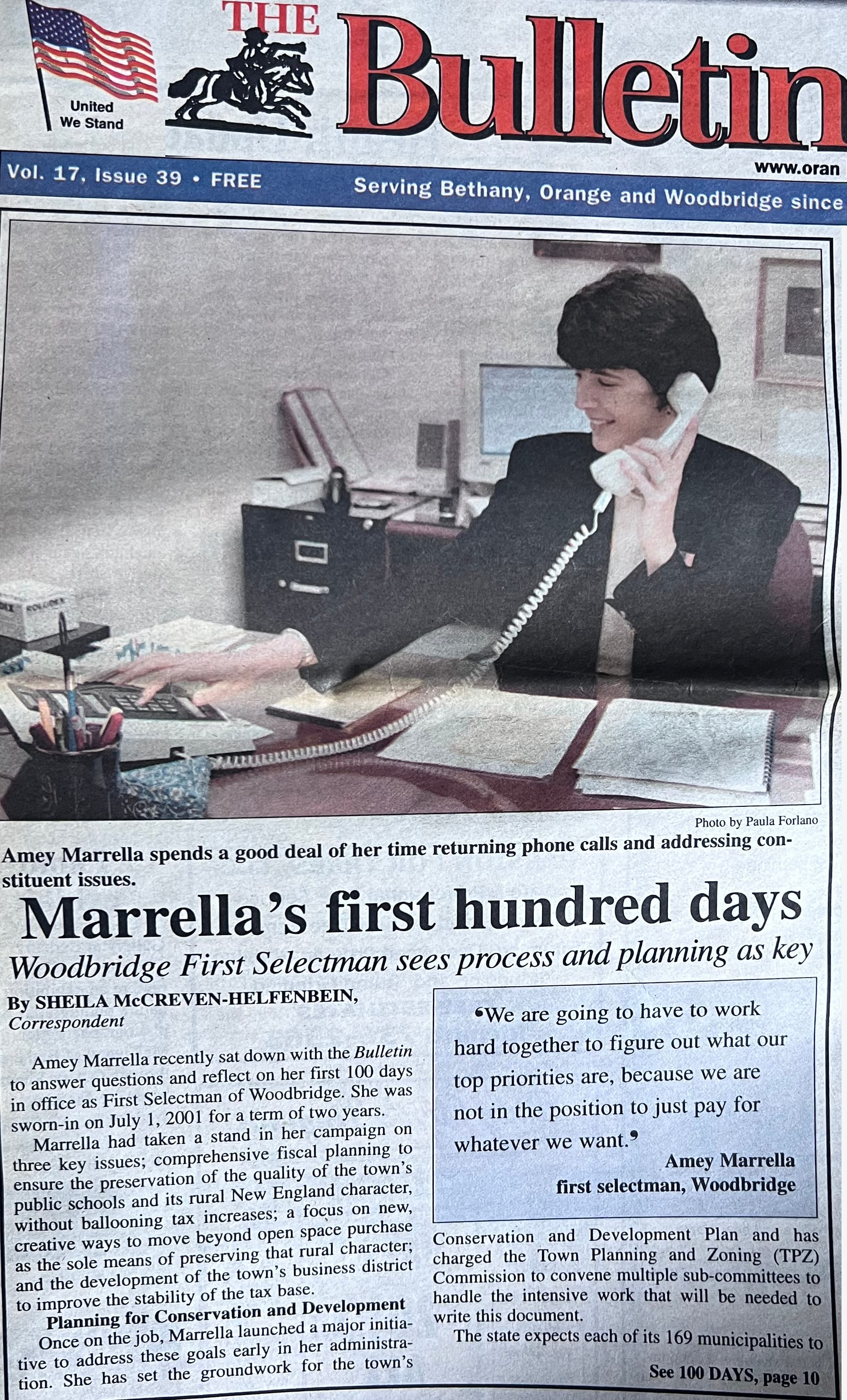Marrella's first hundred days

Woodbridge First Selectman sees process and planning as key
By Sheila McCreven-Helfenbein, Correspondent
Orange Bulletin October 4, 2001
Amey Marrella recently sat down with the Bulletin to answer questions and reflect on her first 100 days in office as First Selectman of Woodbridge. She was sworn-in on July 1, 2001 for a term of two years.
Marrella had taken a stand in her campaign on three key issues; comprehensive fiscal planning to ensure the preservation of the quality of the town's public schools and its rural New England character, without ballooning tax increases; a focus on new, creative ways to move beyond open space purchase as the sole means of preserving that rural character; and the development of the town's business district to improve the stability of the tax base.
Planning for Conservation and Development
Once on the job, Marrella launched a major initiative to address these goals early in her administration. She has set the groundwork for the town's Conservation and Development Plan and has charged the Town Planning and Zoning (TPZ) Commission to convene multiple sub-committees to handle the intensive work that will be needed to write this document.
The state expects each of its 169 municipalities to file a ten-year plan and Marrella is determined to get Woodbridge back on schedule. The town's last comprehensive Conservation and Development Plan was written more than 27 years ago.
Marrella views this plan as the centerpiece of her work as First Selectman. With this new blue print in hand soon, she hopes to focus action on several fronts. She would like to see an Economic Development plan take shape to identify "the kinds of business we want in our Business District, and then actively market the district" taking into account the wishes of area residents, for example, to address traffic patterns and other environmental concerns. She sees development of the town's business district as vital to spreading the tax base, to make major capital projects affordable without necessitating big tax increases.
According to Marrella, the Conservation and Development Plan will also provide the framework for open space preservation efforts. She has asked the TPZ to consider at their October 15th meeting, a zoning change from 1.5 to 2 acres of buildable land per lot in watershed areas, which constitute the majority of town land. She says this approach, recommended at the state level by a blue ribbon panel some 13 years ago, has been successfully enacted in Bethany and she would like to see it embraced here in Woodbridge. The TPZ must initiate a public hearing on the zoning change and citizens will have an opportunity to learn more about the plan and voice their opinions in the coming weeks.

Town boards working together
Marrella is also working to foster better communication and greater understanding between the BOS, BOF and WBOE by scheduling three joint meetings in advance of the budget process. "I'm not expecting that we will agree completely on the numbers – there's always going to be some disagreement. But if we can agree and at least understand the goals of the education system, and we can all understand some of the other projects the town is facing, we can, I hope, end up with a respectful and informed discussion."
"There was clearly an erosion of trust last spring, but there are a lot of new members now" on all boards. "And I think what all of us wants, and what is in the best interest of the town, is to have an elevated level of discussion. That doesn't mean there isn't going to be disagreement, and that doesn't mean there isn't going to be disappointment, but we can at least understand that everybody is making a good-faith effort to do what is in the best interest of the town."
Amity schools budget situation
Marrella also conveyed her thoughts on the subject of the Amity budget deficit. "We had a meeting recently on a Sunday, because that was the only day we could get together, of the BOS, BOF and our four ABOE reps from Woodbridge. And I have to say I am very grateful – everybody showed up and we had a very open discussion about our different concerns, and what we thought needed to be done. We made it clear that Woodbridge didn't want extreme, 'Draconian' cuts in the Amity budget. In Woodbridge we are concerned not only about this year, but about the long-term prospects of the school system."
"The bottom line is that there wasn't fiscal responsibility. My understanding now is that on Tuesday night (October 9th) the full ABOE will meet to make decisions about the budget. We have told our Amity reps 'Don't go for excessive cuts.' But (the ABOE) has to figure out what they're going to do" by balancing some cuts with additional cost savings and perhaps revenue from private funding.
"I think it's inevitable that they will have to go to the three towns to seek additional money. One of the things that has been a point of confusion is the idea that the towns won't let them have additional money. Legally we can not give them any more than our town's budget assigned them in May. So it's going to go through a process now and its going to go to a referendum most likely. There is a cash-flow issue but I don't know what their plans are on timing. It's the ABOE's choice now."
The town's financial situation
Asked about her initial impressions upon assuming the job of First Selectman, Marrella responded "Unfortunately what I found when I took office is that not only was I right about the extent of the town's financial problems, but particularly if our economy sours we will be more vulnerable. We definitely have fiscal 'storm clouds' threatening the town and we are going to have to work hard together to figure out what our top priorities are, because we are not in the position to just pay for whatever we want."
A public forum on the fiscal health of the town was on Marrella's agenda for early fall, but this was meant to coincide with the presentation of two major projects – the Beecher South roof repair and upgrade of the police department's emergency radio service – which are not yet ready to be presented. Marrella says she is currently re-thinking the timing of the first public forum.
"But I don't want to delay the discussion of the town's finances" she said. Accordingly, Marrella has decided that "one of the topics of the first meeting of the Long Range Planning (LRP) Committee will be planning this forum, which I still expect will take place later this fall. Since it's intended to be a forum to give people some information and begin to have a dialog, we don't have to have all the answers yet. We just have to tell people what we know now and solicit their input."
The newly revamped LRP Committee consists of two representatives from the Board of Selectmen, Marrella and Chris Sorensen; two members of the Board of Finance, Matt Giglietti and Greg Egnaczyk; and one representative each from the Woodbridge and Amity Boards of Education, Bunny Yesner and Ken Downey, respectively. Members are already meeting with each of the town's larger departments to discuss the development of the coming capital budget requests, which this year will be reviewed by the BOS in early December.
What the future holds
"We have to look very closely at where we are headed. And I am very concerned. Some people I think, believe that I'm just against taxes. But what I'm really concerned about is if you tax to a certain level you push people out of this community. And we are a community. That's one of the things I like about Woodbridge, that despite our reputation of being just a wealthy town, we aren't."
"We're not the most diverse community in the world but we have ways in which we are different. There are families who have lived here for generations. We have a lot of people who are empty nesters. We have our seniors, as well as people who have kids of different ages. We have people who have moved here in advance of having children. And I would like to hold on to that! Because I don't want the town to force these people out, and also because, as a practical matter, we can't afford it."
"The town relies, to support its budget, on those people who don't use educational services although their taxes pay for education. Because basically, two thirds of the town budget is for education and it's just not sustainable. The average household's taxes are paying for one child to attend Beecher and not even the cost of one child at Amity. So you ought to care if you are forcing out people who don't have kids. That to me is one of the constraints on the educational dollars that we can afford; you're between a rock and a hard place."
"You may want to spend more on education to make it better but you have to recognize that that could tip the scale into what I see is a real potential spiral. Twenty percent or so of our residents are seniors and if that number drops – if people start to say 'Why should I live in Woodbridge? I can live somewhere else' – and the people who buy their homes are families with children going into our public school system, you have a net drain on the system."
Striking the right balance
Marrella is clearly passionate about preserving "the balance" she sees as crucial to what makes Woodbridge such a fine place to call home. She says "In a town of 10,000 we have the unique opportunity to work together," and she would like to be seen as an example of someone who "cares about the town as a whole."
When asked how she would like to be remembered when she is through as First Selectman, Marrella laughs "Hey, I just started!"
But she goes on to allow that she would like to be seen as "a principled person, with a clear sense that there's a right and a wrong way to do things. Maybe because my husband is a federal prosecutor, I have a heightened sense of this. But I would like people to understand that I won't do things for political reasons. I know not everyone will agree with my decisions, but I would like to think they will respect how I make them. I'm a process person, and I want to highlight that."
She adds, "I'm only one person, but I have been very pleased with the reception I've received from the various boards and commissions and their willingness to work together with me. And I am grateful for the people I'm working with. I can't single out just a few for praise – everyone has been terrific."